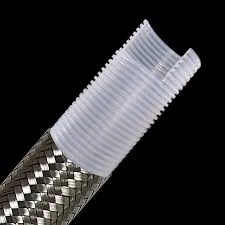Dez . 13, 2024 09:34 Back to list
abrasion resistant hydraulic hose factory
Understanding Abrasion Resistant Hydraulic Hoses A Focus on Manufacturing
In the domain of industrial machinery and construction, hydraulic hoses play a crucial role in the efficient functioning of hydraulic systems. Among the various types of hydraulic hoses available in the market, abrasion resistant hydraulic hoses stand out due to their unique properties designed to withstand wear over time. This article delves into the importance, manufacturing processes, and features of abrasion resistant hydraulic hoses.
The Need for Abrasion Resistant Hydraulic Hoses
Hydraulic hoses are exposed to a variety of conditions that can lead to wear and tear. In environments such as construction sites, mining operations, and agricultural settings, hoses are subject to contact with rough surfaces, dust, debris, and other abrasive materials. Over time, this exposure can lead to hose failures, leaks, and ultimately, costly downtimes and repairs.
This is where abrasion resistant hydraulic hoses come into play. These hoses are specifically engineered with materials and designs that enhance their durability and ability to resist physical damage. Consequently, they prolong the lifespan of hydraulic systems and ensure operational efficiency.
Key Features of Abrasion Resistant Hydraulic Hoses
1. Material Composition Abrasion resistant hydraulic hoses are typically made from rubber compounds or thermoplastics, often reinforced with fibers to enhance strength and elasticity. Various materials, such as polyester and nylon, are commonly used in the inner and outer layers to optimize resistance against external abrasions.
2. Outer Cover Design The outer covering of these hoses is a critical component of their performance. Manufacturers often use textured surfaces or unique patterns that help deflect debris and reduce wear. Some hoses may also feature additional protective layers, such as polyurethane, to provide an extra shield against abrasion.
3. Pressure Ratings Hydraulic hoses are manufactured to withstand specific pressure levels. The best abrasion resistant options are designed to handle both high pressure and high abrasion scenarios. It is essential to choose hoses that meet or exceed the pressure requirements of your specific hydraulic system.
4. Flexibility and Bend Radius While maintaining high levels of abrasion resistance, manufacturers ensure that the hoses remain flexible. This flexibility is crucial for installation in tight spaces and helps in maneuverability during operations. Hoses are designed with a minimum bend radius that must be adhered to in order to avoid kinks or ruptures.
abrasion resistant hydraulic hose factory

The Manufacturing Process
The manufacturing of abrasion resistant hydraulic hoses is a complicated process that involves several stages.
1. Material Selection The first step is choosing the right materials that exhibit high tensile strength and flexibility. Advanced polymer compounds that offer enhanced resistance to abrasion are selected.
2. Extrusion The selected materials undergo a process called extrusion, where they are shaped into the desired form. This is executed with precision machinery that ensures consistency in wall thickness and diameter.
3. Reinforcement Application Next, the hoses are reinforced with braided or spiraled fibers. This stage is critical as it imparts the necessary strength to withstand high pressures and environmental stresses.
4. Covering The outer layer is applied through a series of processes, including curing, which helps enhance the materials' durability. Different textures may be achieved to improve the abrasion resistance of the hose.
5. Testing Once the hoses are manufactured, they undergo rigorous testing to ensure they meet industry standards. This includes tests for pressure, flexibility, and, of course, abrasion resistance.
6. Quality Assurance Finally, a comprehensive quality assurance procedure is followed to guarantee that each hose functions optimally and meets the manufacturer's specifications.
Conclusion
Abrasion resistant hydraulic hoses are an essential investment for industries that utilize hydraulic systems in abrasive environments. By choosing high-quality hoses that prioritize durability and performance, companies can reduce maintenance costs, enhance the reliability of their machinery, and ultimately improve productivity. The intricate manufacturing process behind these hoses ensures that they are equipped to handle the demanding conditions of various industrial applications, making them a vital component for success across multiple fields. As industries evolve and face new challenges, the development and refinement of abrasion resistant hydraulic hose technology will continue to play an essential role in industrial progress.
-
Best Four Steel Wire Spiral Hose Hydraulic R12 – Durable High-Pressure Hose Manufacturer
NewsJul.08,2025
-
High-Quality 1/4 Hydraulic Hose – Soft, Flexible & Durable Rubber Hoses for Industrial Use
NewsJul.08,2025
-
1 1 2 Inch Hydraulic Flexible Hose - Durable, Reliable, High-Pressure Solutions
NewsJul.07,2025
-
High-Quality 1 2 Rubber Hose - Durable, Flexible Hydraulic Solutions
NewsJul.07,2025
-
Discover SAE Hydraulic Hose Types - High Quality & Durable Hoses from Leading Factory Supplier
NewsJul.06,2025
-
High Pressure Wire Hydraulic Rubber Hose Supplier Durable & Reliable 1SN Hose Solutions
NewsJul.06,2025
